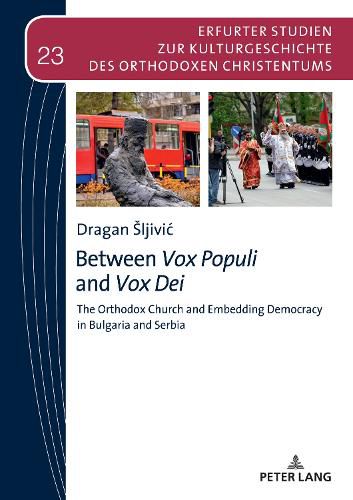Readings Newsletter
Become a Readings Member to make your shopping experience even easier.
Sign in or sign up for free!
You’re not far away from qualifying for FREE standard shipping within Australia
You’ve qualified for FREE standard shipping within Australia
The cart is loading…






This title is printed to order. This book may have been self-published. If so, we cannot guarantee the quality of the content. In the main most books will have gone through the editing process however some may not. We therefore suggest that you be aware of this before ordering this book. If in doubt check either the author or publisher’s details as we are unable to accept any returns unless they are faulty. Please contact us if you have any questions.
Many scholars have claimed that predominantly Orthodox countries face challenges in establishing viable democracies. This book seeks to test this "incompatibility thesis" by drawing on the examples of two countries where the Orthodox Church has played a significant role in their histories: Bulgaria and Serbia. Since 2007, Bulgaria has been a member of the European Union, while Serbia still aspires to join it. Are Orthodox orientations entirely incompatible with democratic values? Are the Orthodox Churches and their heritage really the cause of democratization difficulties in these countries? By examining both Orthodox Churches and Orthodox political organizations, this book offers a detailed and nuanced exploration of the complex relationship between Orthodox political theology, Church-State relations and democratization processes, with a focus on the period between 2007 and 2012.
$9.00 standard shipping within Australia
FREE standard shipping within Australia for orders over $100.00
Express & International shipping calculated at checkout
This title is printed to order. This book may have been self-published. If so, we cannot guarantee the quality of the content. In the main most books will have gone through the editing process however some may not. We therefore suggest that you be aware of this before ordering this book. If in doubt check either the author or publisher’s details as we are unable to accept any returns unless they are faulty. Please contact us if you have any questions.
Many scholars have claimed that predominantly Orthodox countries face challenges in establishing viable democracies. This book seeks to test this "incompatibility thesis" by drawing on the examples of two countries where the Orthodox Church has played a significant role in their histories: Bulgaria and Serbia. Since 2007, Bulgaria has been a member of the European Union, while Serbia still aspires to join it. Are Orthodox orientations entirely incompatible with democratic values? Are the Orthodox Churches and their heritage really the cause of democratization difficulties in these countries? By examining both Orthodox Churches and Orthodox political organizations, this book offers a detailed and nuanced exploration of the complex relationship between Orthodox political theology, Church-State relations and democratization processes, with a focus on the period between 2007 and 2012.